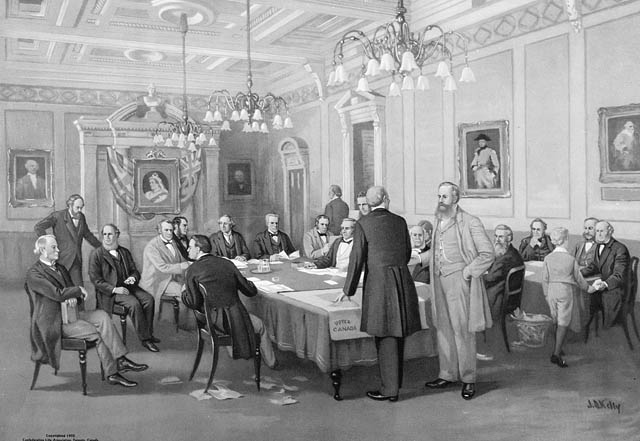London Conference of 1866 on:
[Wikipedia]
[Google]
[Amazon]
The London Conference was held in London, in the United Kingdom, in 1866. It was the third and final in a series of conferences that led to Canadian Confederation in 1867. Sixteen delegates from the Province of Canada, Nova Scotia, and New Brunswick gathered to set out the final outline of the proposed Canadian Confederation, resulting in the ''British North America Act, 1867'' (now the '' Constitution Act, 1867'').
Upon the conclusion of the discussions by the delegates, the British government directed that a bill be drafted to implement the resolutions of the Conference. Introduced in 1867, the ''British North America Act, 1867'' was passed by both Houses of Parliament and then received royal assent from Queen Victoria on March 29, 1867. It was proclaimed in force on July 1, 1867, creating the
 The London Conference began on December 4, 1866.Andrew McIntosh and P.B. Waite, "London Conference", ''Canadian Encyclopedia'', February 7, 2006; updated by Edward Butts and Andrew McIntosh, February 4, 2020.
The London Conference began on December 4, 1866.Andrew McIntosh and P.B. Waite, "London Conference", ''Canadian Encyclopedia'', February 7, 2006; updated by Edward Butts and Andrew McIntosh, February 4, 2020.
/ref> It was a continuation of the Quebec Conference held in 1864, which had produced the Quebec Resolutions. The conference was held at the
Canadian Confederation: The London Conference, December 1866 - March 1867
at
Dominion of Canada
While a variety of theories have been postulated for the name of Canada, its origin is now accepted as coming from the St. Lawrence Iroquoian word , meaning 'village' or 'settlement'. In 1535, indigenous inhabitants of the present-day Quebec C ...
.
The Conference
 The London Conference began on December 4, 1866.Andrew McIntosh and P.B. Waite, "London Conference", ''Canadian Encyclopedia'', February 7, 2006; updated by Edward Butts and Andrew McIntosh, February 4, 2020.
The London Conference began on December 4, 1866.Andrew McIntosh and P.B. Waite, "London Conference", ''Canadian Encyclopedia'', February 7, 2006; updated by Edward Butts and Andrew McIntosh, February 4, 2020./ref> It was a continuation of the Quebec Conference held in 1864, which had produced the Quebec Resolutions. The conference was held at the
Westminster Palace Hotel
The Westminster Palace Hotel was a luxury hotel in London, located in the heart of the political district. Opened in 1860, the hotel was the scene of many significant meetings, including the London Conference of 1866 which finalised the details ...
, just across the street from the British Parliament buildings. John A. Macdonald was the chairman of the conference.
Delegates
In 1866, the Province of Canada was composed ofCanada East
Canada East (french: links=no, Canada-Est) was the northeastern portion of the United Province of Canada. Lord Durham's Report investigating the causes of the Upper and Lower Canada Rebellions recommended merging those two colonies. The new ...
(now Quebec), and Canada West (now Ontario). The Province of Canada sent a total of six delegates, but for the purposes of the Conference, they were treated as two separate delegations.
Canada East
Canada East sent three delegates: George-Étienne Cartier, Alexander Tilloch Galt, andHector-Louis Langevin
Sir Hector-Louis Langevin, (August 25, 1826 – June 11, 1906) was a Canadian lawyer, politician, and one of the Fathers of Confederation.
Early life and education
Langevin was born in Quebec City in 1826. He studied law and was called to ...
.
Canada West
Canada West sent three delegates:William Pearce Howland
Sir William Pearce Howland, (29 May 1811 – 1 January 1907) served as the second Lieutenant Governor of Ontario, from 1868 to 1873. He was one of the Fathers of Confederation.
Biography
Born in 1811 in Pawling, New York, William Howland ...
, John A. Macdonald, and William McDougall.
New Brunswick
New Brunswick sent five delegates: Charles Fisher, John Mercer Johnson, Peter Mitchell, Samuel Leonard Tilley, and Robert Duncan Wilmot.Nova Scotia
Nova Scotia send five delegates: Adams George Archibald, William Alexander Henry, Jonathan McCully, John William Ritchie, and Charles Tupper.Major issues
Inter-colonial railway
One of the major issues when the Conference opened was the proposed Inter-Colonial Railway linking the Province of Canada to the Maritimes. This issue was quickly resolved when Macdonald stated that the Province of Canada agreed that the obligation to build the railway should be included in the legislation.Structure of the Senate
The composition of the proposed Senate continued to be a major issue, with a suggestion from the British government that the Senate be elected, not appointed.Denominational schools
A major issue of contention was the education system, with Roman Catholic bishops lobbying for guarantees protecting theseparate school
In Canada, a separate school is a type of school that has constitutional status in three provinces (Ontario, Alberta and Saskatchewan) and statutory status in the three territories ( Northwest Territories, Yukon and Nunavut). In these Canadi ...
system. This was opposed by delegates from the Maritimes
The Maritimes, also called the Maritime provinces, is a region of Eastern Canada consisting of three provinces: New Brunswick, Nova Scotia, and Prince Edward Island. The Maritimes had a population of 1,899,324 in 2021, which makes up 5.1% of Ca ...
, and the compromise reached was Section 93 of the Act, which guaranteed separate school systems in Quebec and Ontario but not in Nova Scotia or New Brunswick.
See also
* Charlottetown Conference, 1864 * Quebec Conference, 1864 * Anti-Confederation PartyReferences
Further reading
* * *External links
Canadian Confederation: The London Conference, December 1866 - March 1867
at
Library and Archives Canada
Library and Archives Canada (LAC; french: Bibliothèque et Archives Canada) is the federal institution, tasked with acquiring, preserving, and providing accessibility to the documentary heritage of Canada. The national archive and library is th ...
{{Constitution of Canada, Confederation
Canadian Confederation
Constitutional conventions (political meeting)
Diplomatic conferences in the United Kingdom
19th-century diplomatic conferences
1866 in international relations
1866 in Canada
Conferences in London
1866 conferences
1866 in London